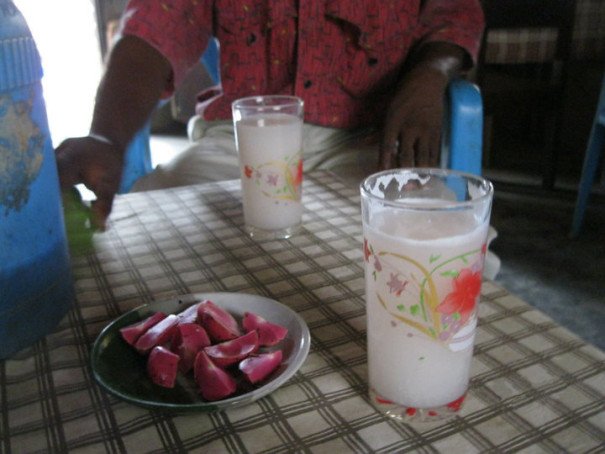
Magical Drinking in Congo

Magical Drinking in Congo
Presumably ‘drinkards’ are drunkards, except if we’re talking palm wine. Drinkards converge at any formal gathering to welcome outsiders, to celebrate life’s surprise bounty—a successful harvest or the birth of twins—or to mourn the passing of a powerful local chief.
Like alcohol anywhere, palm wine is a formidable social lubricant but its undercurrent of magical thinking sets it apart. Amos Tutuola, Nigeria’s answer to H.P. Lovecraft, first chronicled the ritualistic, surreal excesses of palm wine in his 1952 novel. I first tasted palm wine ‘in the bush of ghosts’, and rightly so—the phrase figures in the title of Tutuola’s follow-on experimental work.
Settling into a mud hut in a sandy southern corner of DR Congo years ago (then République du Zaire), a fresh calabash of palm wine appeared at my door each morning. A week passed before learning that Nzolene, my elderly mute neighbor, was responsible. Tata Edouard—her husband and my namesake—had been the village’s erstwhile tapster. Days before my arrival he’d fallen and died while collecting full calabashes from high in a tree for a gathering of drinkards. Now his widow’s offerings of palm wine and kola nuts were duty, as per local belief I was his reincarnation.
Despite years in Congo I never learned to tap or climb palm trees. I didn’t need to; my friends were agile tappers, hunters and shamans. A curious trifecta of talents, perhaps, but in these parts palm wine was the ritualistic glue linking each métier. Pouring wine on animal scat appealed to the deceased for an antelope or monkey sighting during a forest hunt; kola nuts and wine helped divine a remedy for a sick child.
War erupted and continues in places, and now nothing in the country is the same. On a recent visit to a provincial town, Kikwit, I sat down with my only surviving friend from the village, Rémy. All our common acquaintances are dead, the shamans and famous hunters we knew—even his parents who had modestly furnished my little mud hut twenty years ago.
On his table was a five-liter container of malafu ya ngasi and a plate of fresh kola nuts, rarities in such an urban setting. We were drinkards again. This time the ghosts were in our head, our reminiscence of people gone, of peaceful humble times obliterated by Congo’s long and pointless war. It was our own moment of magical thinking.